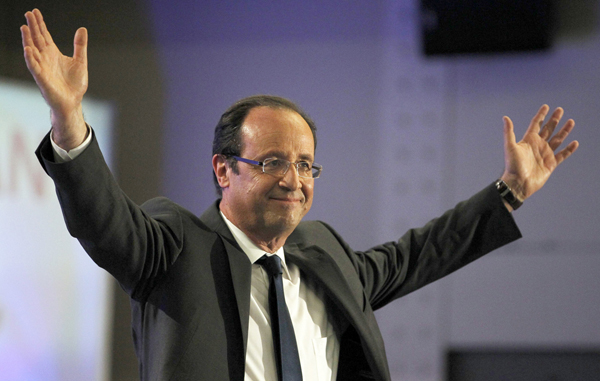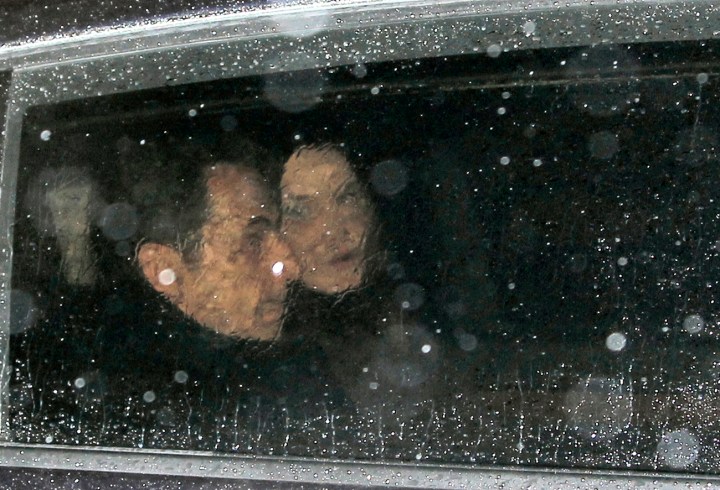In the first round of the French presidential election, left-wing challenger François Hollande took a frontrunner’s position, ahead of incumbent president Nicolas Sarkozy. Because, as expected, none of the 10 candidates on the ballot won 50% of the vote, there will now be a run-off between the president and his challenger on 6 May. J BROOKS SPECTOR takes a look at the election campaign so far, and gives us a brief profile of the contenders and the leading man as a bonus.
One has to wonder what Dominique Strauss-Kahn must be thinking right now. A year ago, DSK was ready to dust off his best tuxedo for the inaugural balls. He was poised to accept graciously the Socialist nomination for president of France, and then to embark on a grand, stately progression through the formality of a coronation, oops, election. All of this would follow his well-regarded service as one of the international masters of the universe as top dog at the International Monetary Fund.
Now, undone by lust, tabloid-style accusations from a West African immigrant chambermaid working a ritzy Manhattan hotel and, even worse, some newer charges of involvement with an international prostitution ring, it is Hollande rather than DSK, who – if the polls are accurate – is moving forward to turf out Sarkozy and make him France’s first one-term president since Jacques Chirac. This would make Hollande the first Socialist president of the Fifth Republic since Francois Mitterand.
The French, of course, do things a little differently. For starters, their electoral cycle is somewhat shorter than the never-ending American one. This time around they have 10 listed candidates on their first-round ballot rather than just two or three in a general election. The two top vote-getters then have to deal with a one-on-one face-off in a second and final round that, this time, takes place on 6 May.
And, rather sensibly it would seem, campaigning must stop on the Friday before their Sunday voting day, with the Saturday between reserved for voters to contemplate their task without all those annoying television commercials, last-minute door-to-door campaigning or importuning phone calls begging people to vote for this or that candidate. For someone who is already a bit weary of the never-ending campaign, this suddenly sounds pretty sensible.
While Sarkozy and Hollande will be the remaining survivors in round two, with everyone else voted off the island, the results from round one indicate Sarkozy is headed for some big electoral trouble in the final match-up. French voters are clearly embracing Hollande’s promises of fewer, less drastic spending cuts than Sarkozy’s proposed austerity programme. They also like Hollande’s promises to institute some seriously higher taxes on the wealthy to fund state-aided job creation, promising a 75% upper tax rate on incomes above 1 million euros, something like a French-flavoured Buffett Rule on steroids.
Sarkozy, on the other hand, has argued he is the safer, much more experienced pair of hands to keep on the wheel in the event of future economic turmoil, although his countrymen and women apparently aren’t in an agreeable mood, given that French unemployment comes in at about 10%, among other economic troubles.
Sounding a warning about the lack of real substance to the campaigning, French journalist Olivier Guez, wrote in the German Frankfurter Allgemeine Zeitung: “From the subject of halal meat to the matter of driver’s licences, the French presidential campaign that culminates in voting on Sunday has been marked by peripheral squabbles and endless invective among the 10 candidates. But few things have been said about the gravity of the French economic crisis: the deficits in France’s public accounts and balance of payments; its drop in competitiveness; its decline in international commerce; its apathetic growth.”
“Nor have we heard much about the threat of increased unemployment and reduced purchasing power from the austerity measures that the markets expect any president to take — right after the election, of course. As for civil war in Syria, the perilous transitions in Arab countries, al-Qaeda’s progress in the Sahel, or Iran’s nuclear programme, the candidates have behaved as if nothing were the matter – as if France were tacitly abandoning all influence abroad. These omissions say a great deal about the state of a country that has rarely seemed so avid in its navel-gazing, so inward-looking. In short, France in 2012 is an old nation that increasingly cultivates the temptation to be an island unto itself.”
French voting stations open at 08:00am on Sunday and close at 18:00 – except in the country’s larger cities, where polling stations stay open two hours later. According to news reports, voting was running heavy in Paris and among the hundreds of thousands of French expatriates based in London.
As the exit polling data came in, in advance of the actual voting stats, the results showed Hollande at 28.5%, Sarkozy at 27.1%, nationalist-rightist Marine Le Pen at a surprisingly high 18.2%, far leftist Jean-Luc Mélenchon had reached 11.1% and independent centrist Francois Bayrou was at 9.1%.
If Hollande wins on 6 May, he would become France’s first left-wing president since Francois Mitterand, who beat incumbent Valery Giscard-d’Estaing way back in 1981 and then the challenger Jacques Chirac in 1988.

Photo: Francois Hollande, Socialist Party candidate for the 2012 French presidential election, waves to supporters after delivering his speech in Tulle after early results in the first round vote of the 2012 French presidential election on 22 April 2012. REUTERS/Regis Duvignau.
The voter turnout appears to have just missed 82%, not a record but above expectations from earlier voter surveys. After the 6 May run-off election that must follow this first round, the French will get a chance to troop back yet again to the polling booth in elections for their parliament a little later on in the year.
In his final first-round election rally in the southern city of Nice, a revved up Sarkozy – wound up even more than he usually is in public – told supporters he was fighting for his political life “with a force I have never before expressed and with an absolutely unbreakable desire”. Despite these sentiments, Sarkozy is still going into this voting with the lowest end-of-term ratings recorded for any French president since the 1950s. As a result, pollsters are increasingly predicting Sarkozy will meet the same fate as the Italian, Greek, Spanish, Portuguese and Irish leaders who have all been run out of Dodge since the start of the euro zone crisis. Italy’s Berlusconi, of course, had more to contend with than merely national economic survival.
Sarkozy’s real lack of popular support as his first term comes to an end thus represents a gift to the usually cerebral, rather distant Hollande. And so, after his first-round percentage – plus those of the other leftwing candidates closes in on 50% – he might well be forgiven for growing confidence that he, and not Sarkozy, Carla Bruni and their little bambino will soon be living in the Élysée Palace.
The most recent Ipsos poll, released on Friday, showed Hollande was holding a lead of 3.5% for the first round – and a dominating 12% margin in a two-man race, but there is a modest brace of footnotes to be, well, noted. First, an extraordinary 28% of French voters – or about 12.5 million people – say they remain undecided about whom they plan to vote for on Sunday. Moreover, pollsters have also detected an unusually large number of would-be French voters who say they may simply forego bothering to vote at all – apparently saying politics will not solve the nation’s problems. The effect of either or both of these circumstances could obviously have an important impact on the final tallies.
Then there is also the uncertain effect of the numbers of voters who went with the Left Front’s (effectively the Communist Party) candidate, Mélenchon. Or, alternatively, Le Pen’s Xenophobia Party (okay, it’s not actually called that, but it probably should be) in the first round, as a “plague on both your houses” protest. Le Pen’s father benefited from that behaviour several times in the past in the opening rounds and his daughter seems to have done it yet again, especially in the wake of the recent Toulouse shootings that are still fresh in the minds of most French people.
Photo: Marine Le Pen (L), the National Front party leader and their candidate for the 2012 French presidential election, dances at the Equinoxe meeting hall in Paris after early results in the first round vote of the 2012 French presidential election on 22 April 2012. REUTERS/Pascal Rossignol.
The winner of this election stands to inherit a France whose international position has grown significantly over the past five years, in part from Sarkozy’s own activist role in partnering with Germany’s Angela Merkel to deal with the European financial crisis. But this same France has a debt-laden economy taking some real strain and its collective national conscience has been undergoing a kind of mass self-reflection since the Toulouse killing spree.
Economist Paul Krugman offered a less than ringing endorsement internationally to Hollande as a candidate, writing that “An Hollande victory would shake things up, and offer at least the possibility of something better. Oh, and Hollande is clearly a crazy person for actually calling for tax rates on top incomes that are around as high as leading public finance experts calculate they should be.”
Given these uncertainties, Hollande has already begun some strategic manoeuvering, such as trying to cozy up to Mélenchon’s supporters, hinting he might raise the minimum wage as a part of his economic policies. Meanwhile, he seems to have struck a chord with numerous voters via his call to “strike at the Merkozy axis” by punishing Sarkozy for his joint role with Angela Merkel as architects of the euro zone’s crisis responses of austerity budgets and bailouts.
Moreover, Mélenchon has been urging voters to support him rather than just vote against Sarkozy, to “raise the demands of the left”. This would be a way to leverage additional concessions from Hollande, if he goes into pole position in round two.
On the other side of the race, Le Pen’s demonstrated appeal to voters may well have the effect of pushing Sarkozy further to the right, in part by her fiery denunciations of immigration as the proximate cause of all of France’s problems. Like Mèlonchon, she has been able to channel some serious discontent with the country’s mainstream political elite, in her case dubbing the election’s frontrunners the “Siamese twins”.
In America, the libertarians and the leftist fringe usually call the choice between Republicans and Democrats as one of between “Tweedle-dee and Tweedle-dum”. But readers surely get the intended picture – Le Pen’s argument is something on the order of why go with either of these two pallid carbon copy candidates? Instead pick someone really different for a change to see if things improve.
And then there is Francois Bayrou, another veteran politician who could best be described as representing the radical centre. Given his vote totals, there are rumours Sarkozy would be willing to offer him the premiership in a second Sarkozy administration, in return for Bayrou’s support in round two. Could he be the French answer to Nick Clegg?
Assuming Hollande wins the presidency, what kind of politician – and person – is he? Just a year ago, when he said he would run for that office, most observers looked at him with indifference or derision. Former prime minister and long-time Hollande rival, Laurent Fabius, sniffed publicly a while back, “Frankly, can you imagine François Hollande as president of the republic? You must be dreaming.” But if he wins, almost by default, he will have become the European-wide champion of politics on the left.
The usual view has been that Hollande, with a reputation of being a politician who has honestly won his nickname of Flanby – a caramel pudding – would never have become the Socialist Party’s candidate for president, save for DSK’s self-inflicted mortal wounds. Naturally, Hollande’s corner sees things just a little differently.
After being party first secretary for eleven years, Hollande surrendered that to plot his presidential run. He began exercising, dropped some weight and tuned up his look with new, serious, “I-wanna-be-president” spectacles. He’s also given up using his three-wheeled scooter because it is insufficiently dignified for a man of his evident ambition. Or as he said about this question: “I had to mature from the light-hearted and funny first secretary of the party and show a more respectable, presidential face.” Maybe what that really means is: “I’ll even ride in a chauffeur-driven limo if that is what it takes to make me president”
Some observers say his more gravitas-injected public persona seems somewhat out of character for a man with a self-effacing wit and a tendency to avoid confrontation. Both Sarkozy – and Hollande’s detractors inside his own party – argue that these qualities simply don’t add up to presidential character, where one must be able to stand up for the nation on the international scene, take those 3am calls and make the tough decisions.
Aides reply simply that Hollande is just the kind of man whose natural inclination is to find detours around obstacles so he can keep going forward to his original goal. This tougher side was apparently in evidence when he won the party’s primary to become its champion, an effort that even included elbowing aside his former partner, Segolene Royal, the woman who had been the party’s losing candidate in the previous presidential election. Since they went their separate personal ways, Hollande has now partnered up with Valérie Trierweiler, a former Paris Match news magazine journalist.
Sarkozy forces, meanwhile, criticise Hollande for his lack of central government experience, despite being a graduate of ENA, the elite university that trains most of the country’s economic and political elite. Starkly different from Sarkozy, Hollande remains well rooted in rural France by virtue of his parliamentary and local authority constituencies in Corrèze, the south-central region where former president Jacques Chirac also has his political roots. Chirac even said last year he would vote for Hollande, a move that enraged Sarkozy, say journalists.
While Hollande has been unable to ramp up his rhetoric on the campaign trail like some politicos, his winning card may well be his promise to be a “normal president”, something that Sarkozy self-evidently has not been. This lack of transcendental fervour on the part of Hollande may reach back to the days of his first entry into politics. When he first came into the game in the wake of the 1968 student rebellion, he wasn’t really a central figure in it. Or as he told Libération: “I am neither a moderate socialist nor moderately socialist. I am a socialist, that’s all.” This may help explain why more doctrinaire leftists have shifted towards Mélenchon for their dose of transcendent ideology.
Despite his fairly tepid socialism, the financial markets have declined to embrace him. His promise of fiscal discipline on the one hand has apparently been trumped by his other plans to increase spending and hike taxes, to undo some of Sarkozy’s pension reforms, and to bear down hard on the banks and all that “large and in charge” financial house executive pay.
Or maybe it was just his comment a while back in which he said: “I don’t like the rich.” Yep, that might just about do it. Regardless of the thumbs down by the big banks towards him, Hollande is now, in what American sportscaster Mel Allen famously used to say, sitting in the catbird seat. DM
Read more:
- France goes to the polls at the Financial Times.
- Amiable apparatchik with eyes on the Élysée at the Financial Times.
- Voting begins in France, economy may doom Sarkozy at Reuters.
- Polls open in France for presidential election at the AP.
- Decoding the French Presidential Election Early at The New York Times.
- A Note on the French Election at The New York Times.
- Voting for Yesterday in France at The New York Times.
- With Vote Days Away, Outlook for Sarkozy Dims at The New York Times.
- In France, Using Lessons From Obama Campaign at The New York Times.
- The anti-Sarkozy vote at the Economist.
- Electoral mathematics – History lessons at the Economist.
- Hollande and Merkel – Fireworks ahead at the Economist.
Photo: France’s President and UMP party candidate for the 2012 French presidential elections Nicolas Sarkozy and his wife Carla seen through the raindrops on the window of their car as they ride on the way to addresses supporters at La Mutualite meeting hall in Paris after early results in the first round vote of the 2012 French presidential election on 22 April 2012. REUTERS/Jean-Paul Pelissier.









 Become an Insider
Become an Insider